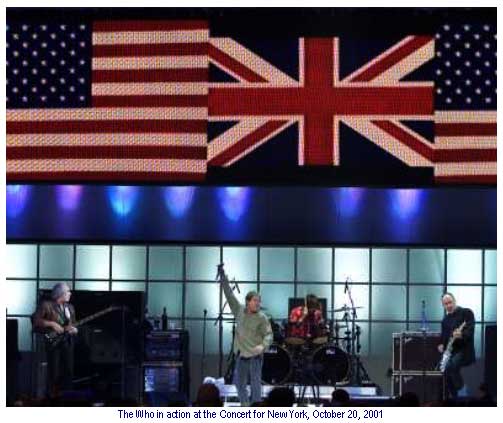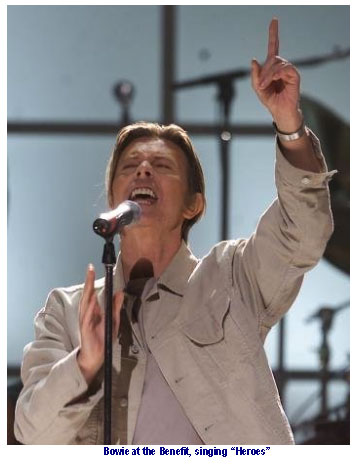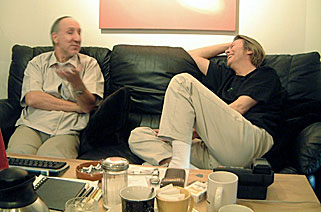

I like very much and respect David Bowie, and love The Who. Partick worships David Bowie, but when queried about how The Who rates in his cosmology declared, "Meaty, beaty, wet, and nasty." What's that supposed to mean? I demanded. "Also wrinkly," he explained.
I was irritated, yes. For one thing, I have not nearly the talent for bizarre slander that Partick does. For another thing, I'm perfectly aware that he could plausibly deny that the "meaty, beaty, wet, and nasty" business was slanderous, just a play off of the band's first compilation record, Meaty Beaty Big and Bouncy, with the substitution of the words "wet and nasty" just to make me squeamish about declaring them either good or bad because what precisely I would mean by that, hmmmm? Furthermore, Part would state "wrinkly" was a matter of record, but what's wrong with that? The surviving Who are all in their fifties. But the worst thing is that I could not come up with something similar about David Bowie and make it stick. And it's so unfair. I mean, David Bowie studied mime. He dressed up as a harlequin for his "Ashes to Ashes" video, long after he should have known better. He released an album that had a big close-up of his head on the cover, and his hair was permed.
So why has David Bowie's name more and more become a code word for "cool" while, say, Pete Townshend's represents deafness and silliness of all sorts? Well, there are reasons, and most of them are pretty good ones. Like, look at them. David Bowie at his fruitiest has an otherworldly beauty and each of his eyes is a different color. He even pulls off that stupid perm.
Meanwhile, Roger Daltrey could hardly pull off his own naturally curly hair and vacant (matching) blue eyes. Keith Moon was a pudgy spaz, John Entwhistle a sour stoic, and Townshend has a high voice and a nose he himself describes as resembling a shovel. Bowie's oeuvre has its roots in folk music, The Who's in Dixieland. Bowie ended shows early in his career by dramatically mussing his lipstick, The Who would destroy their equipment. Bowie is elegant in the most garish dress, whereas even in their mod finery The Who have a sloppy habit of wearing their hearts on their sleeves. Bowie is a hot-house exotic--even in the select company of the excellent musicians who comprised the Spiders from Mars, he radiated mystery while they lumbered around like doofuses in weird clothes and make-up. Unlike David Bowie, who doesn't look like anyone, The Who look like people you'd see around, but maybe not necessarily the ones you'd want to be around. They are a notoriously grumpy bunch of guys.
But I have an affection for them that I will never feel for Bowie, and I don't have to look any further than the Concert for New York to remember why. The benefit was arranged by Paul McCartney with funds going to Robin Hood Relief Fund, but perhaps its most notable aspect was it's audience--5,000 members of New York's fire, police, and rescue crews were given primo tickets, they filled the auditorium floor and lower decks. Most of them held aloft pictures of loved ones killed in the September 11 attacks. The lineup was every bit as stellar as the dreary candlelit broadcast aired a few weeks previously, but unencumbered by the notion that solemnity was the only appropriate response to catastrophe. There was a visceral need for movement--dancing, for shouts. Despite the omnipresent tokens of loss, the audience seemed less sick with grief than sick of it--on October 20th, 2001, the Concert for New York was the world's best wake.
Bowie opened the concert, sitting alone, cross legged on the stage with a toy, a beat box playing "oom pah pah" to accompany his rendition of Simon & Garfunkel's "America."
"Kathy, I'm lost," I said, though I knew she was sleeping
"I'm empty and aching and I don't know why"
Counting the cars on the New Jersey Turnpike
They've all come to look for America
Honestly, it's not a song I'm crazy about (though it was marvelously deployed in Almost Famous), but in this context it was an assertion of principle--not of Paul Simon's penny-ante ennui, but of a decided effort to take comfort today in what was good and had been adored for years, in America. Starting simply, Bowie brought focus to a huge, jostling crowd, busy and chatty, like the best teachers who never have to say, "Now, class."
Once he had everybody's attention, Bowie brought the lights up and his band out, thanked his local ladder company, and sang "Heroes" to the heroes. It was an impressive start to a show that The Who stole three hours later.
Now, The Who have been a crowd favorite ever since Pete Townshend accidentally hit the ceiling of a club with his guitar (it made an interesting sound when held close to the florescent lights) and snapped it at the neck. Enraged, he smashed its remains on the floor. The next week, the club was packed, and instrument carnage -- mostly by Townshend or drummer Keith Moon, though Roger Daltrey pitched in from time to time--became de rigueur for Who shows for years after. Likewise excessive volume, first used as a means to suppress unwelcome audience suggestions re their playlist. In hardly any time at all, The Who was cited in The Guinness Book of World Records as "The World's Loudest Band," and Townshend has the tinnitus to back up the claim.

But even the very considerable appeal of noise and violence wouldn't explain their decades old following, however, nor their ecstatic reception at the Concert for New York. If that was all they had going for them, they would be Quiet Riot, not The Who.
With The Who, you get everything, everything you think of as a rock band. There's almost nothing you could say about them that you couldn't contradict with equal conviction. For instance, they are a massively successful and respected group that has never had a number one single in the US (the highest they ever reached on the charts was number eight with "I Can See for Miles"), nor have they ever been nominated for a Grammy.
Or consider the band members. The Who never seemed like pals, like The Beatles, say. They projected hostility from the get go. But unlike The Beatles, say, they could never let one another go. For the album Quadrophenia, Townshend described the four as competing factions of a single mind, a uniquely suitable conceit. The combination of Pete Townshend, Roger Daltrey, John Entwhistle, and Keith Moon is less like a group than a family, and less like a family than a dysfunctional individual. There were never any controversies about their line up, and no defections. Each are among the top of their professions, Townshend as song writer and guitar player, Daltrey as singer, Entwhistle on bass, and Moon on drums. It's tempting to imagine any of them could have been the star player of any band, but difficult to imagine they could have performed as nearly as well as they did if they hadn't nagged one another to greatness. Moon's death in 1978 was less a shake-up than an amputation. None of the prosthetic drummers who followed could be taken seriously as "the fifth Who." In performance twenty odd years later, the band still seems wounded. But if that is too Behind the Music-y for your tastes, consider the music itself. For while The Who has generated as many power-chord driven rock anthems as anybody, I would propose The Who has the least conventional resume of any mainstream band. Consider that their pop manifesto "My Generation" was followed a year later with the single, "I'm a Boy." A sample lyric from this ditty about gender confusion:
My name is Bill, and I'm a head case
They practice making up on my face
Yeah, I feel lucky if I get trousers to wear
Spend evenings taking hairpins from my hair
Keep in mind, this was released in 1966, long before androgyny was an overt concern of Rock and Roll. It even predates David Bowie's participation in The Society for the Prevention of Cruelty to Men with Long Hair. The song's author, Pete Townshend, is a strange guy, and there is nothing strange about him writing the song, but you've got to wonder how he got the blossoming stud singer Daltrey and the solemn bass player Entwhistle to sign on to it.
The song was anything but an aberration. The next year, The Who released their first love song, "Pictures of Lily," about a boy and his porno mags. They have released any number of songs that seem to be going along just fine when they slip in an excruciatingly revealing detail or observation. Hearing them is something like the sensation of watching a loved one vomit, a churning mix of revulsion and tenderness, complicated by the band's bold, even inspiring presentation and music. Dignity has never been a priority for The Who, and no matter how hard anyone might try to put them on a pedestal, and however much they deserve to be there, they keep falling off of it.

The Dude and the Duke (Townshend & Bowie, 2001)
I spit out like a sewer hole
Yet still receive your kiss
How can I measure up to anyone now
After such a love as this?
The above is the last verse from the first song The Who sang at the Concert for New York. Written from the depths of Townshend's alcoholic depression, "Who Are You" isn't so much an apologia as a flat out apology for drunkenness and waste, performed by men who had been through a lot for men who had been through much more. The men on stage looked a lot like the men in the audience, and an uncomplicated respect was evident on both sides.
Never a band to put on airs, The Who has an instinctive and abiding regard for tradition. Rather than portraying themselves and their alter egos as proud non-conformists, they address the common impulse to fit in, and the more common result of failing miserably at it. In fact, the last song they played, "Won't Get Fooled Again," was notorious for taking a swipe at the counter culture instead of at the establishment. This is unusual, to say the least, for a rock band, especially one noted for innovation (The Who has been credited for the first concept album, The Who Sell Out, and the first rock opera, Tommy, as well as laying the musical foundation for the entire punk movement). They are sympathetic to the desire to be part of something bigger, something beyond the selfish, puny ego, whether that is as a countryman, a band mate, a police officer, or a fireman; and stood proudly under the old, and proudly square Union Jack, Star Spangled Banner, and the undamaged towers of the World Trade Center.
In the ways that are important, The Who are Us.
(Written by Sharon C. McGovern)
Related
Article: The Kids
Are...
Back to Cobra Music